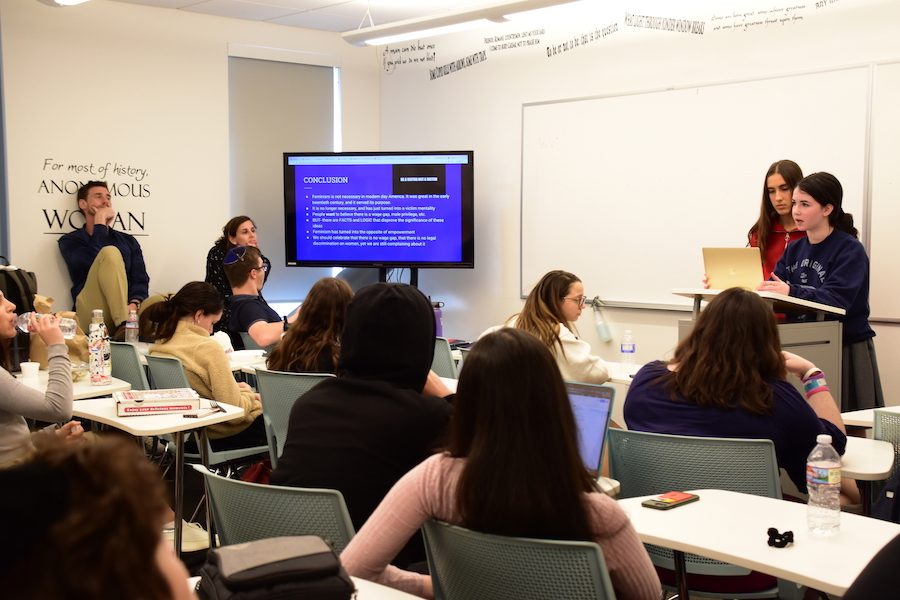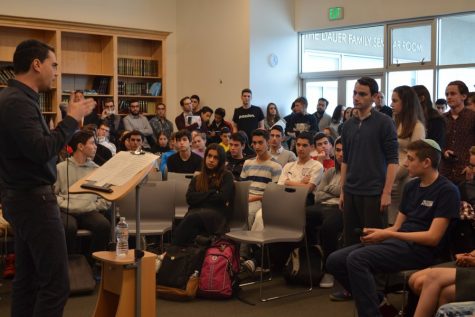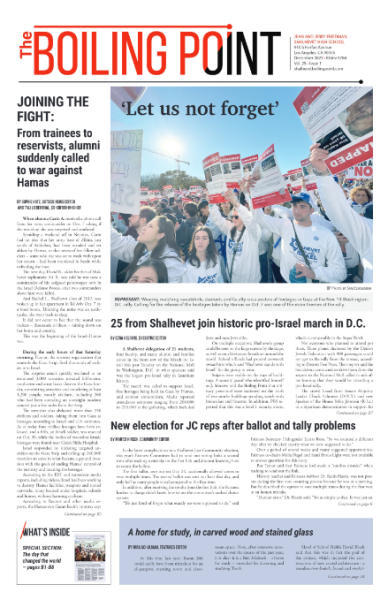YAF wonders whether feminism is still needed
DISCUSS: Lunchtime meeting heard diverse opinions on pay, privilege, and #MeToo.
March 5, 2019
Do Shalhevet students believe women have full rights in America? A Young Americans for Freedom meeting Feb. 12 explored this and related subjects during a standing-room-only session on feminism at lunchtime in Room 216.
The two co-chairs of the school’s Young Americans for Freedom chapter, Kate Orlanski and Sivan Karz, led the conversation, starting from a perspective that feminism is not needed in America today.
Though women are oppressed elsewhere, the two sophomores said, feminism is no longer needed in the United States. Kate criticized Iraq and Yemen’s policies regarding women.
“In these places, there are child brides, women are publicly harassed, and even kidnapped, all of which the government overlooks,” Kate said.
“We acknowledge that feminism is definitely necessary in a lot of other countries,” she said afterwards. “But we were kind of trying to prove that it’s not necessary in modern-day America.
As a feminist, I actually denounce that idea of social privilege. It’s a thing that exists but we actually need to demolish it if we want to be truly equal. If we want to say that we are equal lets both pay for the date, we want to protect our children, let’s all protect our children.
— Daniella Silva, Receptionist
“The main idea of this meeting was to share the conservative view on feminism and give a perspective on it that might otherwise not be heard.”
Her view found support at the meeting. For example, freshman Jack Sanders said feminism mattered more in countries where women are treated worse.
“I think we should all have the textbook feminism, like the original kind of movement of feminism, equal rights, opportunity,” said Jack. “I think where it really matters is where women are getting beheaded and can’t drive.”
The two heads of the meeting led the discussion, and members with contrasting views gradually contributed more as the meeting went on.
Other topics were wage discrimination and sexual harassment.
Sivan and Kate said that the statistic that women earn 77 cents for every dollar that men earn— cited by the US Census Bureau in 2014, is not caused by discrimination.
Instead, they said, statistics show it’s caused by variables such as women being less likely to ask for a raise, men being more willing to work longer hours and relocate, and women being more likely to work in professions that pay less.
“We wanted to make sure we presented the facts,” Sivan said. “There are many variables that go into that study which is just really broad.”
On the subject of sexual harassment, the club showed a video of political commentator Ben Shapiro, who said the slogan “Believe all women” was sexist.
“You can’t believe all women any more than you can believe all men,” Mr. Shapiro stated in the video.
Sophomore Alessandra Judaken argued that cases of sexual harassment are much more complex than just believing all women.
“There must be facts and evidence, I don’t think we can just believe anyone,” said Alessandra.
There was push-back, however, throughout the meeting. Forty-six students attended — 13 male — in addition to YAF adviser Mr. William Reusch, English teacher Ms. Na’amit Nagel, music and journalism teacher Ms. Joelle Keene and Ms. Daniella Silva, school receptionist.
Junior Josh Weindling said that even in the U.S., there was some reason for women to be concerned.
“If you look at sexual harassment in the workplace, it’s mainly women,” said Josh.
Junior Anna Weiss said that women in America still have a long way to go.
“These are places where feminism is very necessary but I don’t think that doesn’t mean that it’s not necessary here,” she said. “Just because we’ve come a long way doesn’t mean we don’t want more power.”
Senior Nomi Willis said that the “believe all women” attitude stems from the #MeToo movement.
“I don’t say ‘believe all women’ because I think women are inherently more trustworthy or anything like that,” said Nomi. “I think statistically it’s so much more likely that women have been sexually abused or sexually assaulted that it’s important to give the sentiment that we should start by trusting women, so that it can be a safe environment for women to come forward in.”
And some topics became less clear-cut than expected.
For example, the meeting ended with an exploration of the topic of gender “privilege.” Sivan said that while people think of privilege as being something men have, women do too because they are traditionally not drafted, they are often given priority when evacuating from an emergency, and judges tend to favor them in child custody battles.
On the other hand, several women in the room expressed the fear that they experience walking on the street that they believe men may not share.
Danielle Silva, who had defended feminism in other areas, agreed that privilege was a problematic for both sexes.
“As a feminist, I actually denounce that idea of social privilege,” Ms. Silva said. “It’s a thing that exists but we actually need to demolish it if we want to be truly equal. If we want to say that we are equal lets both pay for the date, we want to protect our children, let’s all protect our children.”
Before the meeting took place, Sivan and Kate met with a few students and faculty members who identify as feminists to come up with better topics. According to Sivan, they met with Ms. Nagel and a few students including juniors Maia Lefferman, Anna Weiss, and Danya Helperin.
“We wanted to talk to people who consider themselves feminists to actually figure out what people believe so we could talk about those things,” Sivan said in an interview later. “You always hear in the news these radical things, and we weren’t going to have a meeting about things no one actually believed.”
Editor’s Note: The print version of this article misidentified who said,“If you look at sexual harassment in the workplace, it’s mainly women.” It was Josh Weindling, not Joseph Klores. The Boiling Point regrets the error.
Get the latest from The Boiling Point. Sign up for our news feed.

















Yosef Nemanpour • Mar 9, 2019 at 7:02 pm
I want to echo Jonah Gill’s remarks.
Also, I go to UCLA and there is a profound feminists group on my campus actually (-italicized) believe in radical things like dismantling capitalism and all social structures that are male dominant—so everything.
To each their own, I don’t pay too much attention to it, but people do believe in these things.
Jonah Gill • Mar 5, 2019 at 7:07 pm
As a recent alum: what on earth is going on?